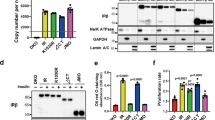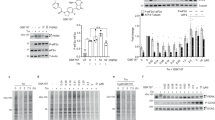Abstract
Both p21ras and phosphatidylinositol 3-kinase (PI 3-k) are critical elements in signaling pathways mediating insulin/IGF-I induced cell cycle progression. For example, microinjection of antibodies, peptides, or recombinant proteins which block the interaction of the SH2 domains of the PI 3-k p85α subunit with tyrosine phosphorylated intracellular targets blocks insulin mediated DNA synthesis. We report here that this inhibitory phenotype is observed whether the injections are made into quiescent cells (the standard approach), or at any time point during G1 phase subsequent to stimulation. This observation is not true, however, for the major substrate of the insulin/IGF-I receptor (IRS-1) despite the well known interaction of p85 with IRS-1. Antibodies to IRS-1 are inhibitory only when injected during the first 15 min of G1 phase, as are antibodies to another major IRS-1 binding protein, the tyrosine phosphatase SHP2. We also have microinjected reagents which target proteins involved in the formation of rasGTP and which mediate some of the downstream effects of ras activation. Reagents which target the formation of rasGTP (Shc and dominant negative ras protein) inhibit DNA synthesis only at points early in G1, as do reagents which target components of the MAP kinase pathway. Injection of antibodies to p21ras itself, or a recombinant Raf-1 protein domain which binds to the effector region of ras in a GTP-dependent manner, results in the inhibition of cell cycle progression throughout G1 phase. The results point to a continuous requirement for both PI 3-k and ras activity until cellular commitment to DNA synthesis, although some of the molecules which are both upstream and downstream of these activities are only required transiently. Our results are also consistent with a Raf-1 independent ras activity late in G1, as well as IRS-1 independent effects of PI 3-kinase.
This is a preview of subscription content, access via your institution
Access options
Subscribe to this journal
Receive 50 print issues and online access
$259.00 per year
only $5.18 per issue
Buy this article
- Purchase on Springer Link
- Instant access to full article PDF
Prices may be subject to local taxes which are calculated during checkout
Similar content being viewed by others
Author information
Authors and Affiliations
Rights and permissions
About this article
Cite this article
Rose, D., Xiao, S., Pillay, T. et al. Prolonged vs transient roles for early cell cycle signaling components. Oncogene 17, 889–899 (1998). https://doi.org/10.1038/sj.onc.1201997
Received:
Revised:
Accepted:
Published:
Issue Date:
DOI: https://doi.org/10.1038/sj.onc.1201997



